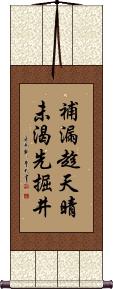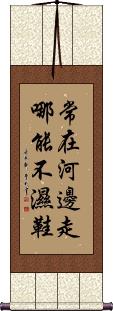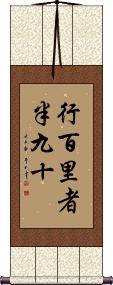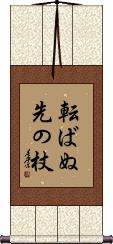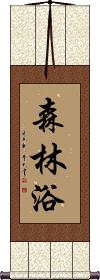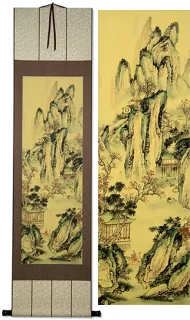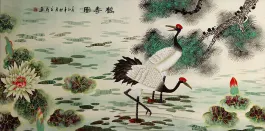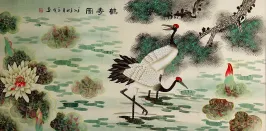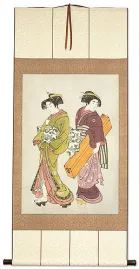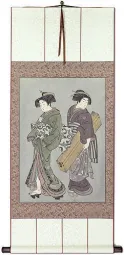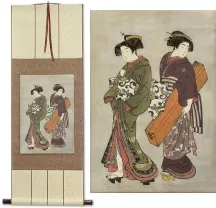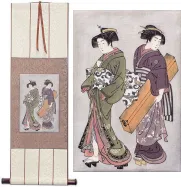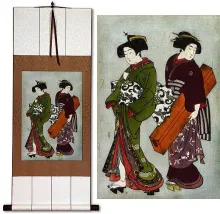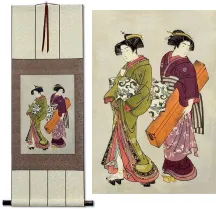Many custom options...
And formats...

Walking in Chinese / Japanese...
Buy a Walking calligraphy wall scroll here!
Personalize your custom “Walking” project by clicking the button next to your favorite “Walking” title below...
1. Fix the roof before the rain; Dig the well before you are thirsty
2. One who walks by the river may end up with wet feet
3. A sly rabbit has three openings to its den
4. Standing by Oneself / Walking by Oneself
5. Walking 100 Miles: Stopping at 90 miles, is the same as stopping half-way
Fix the roof before the rain; Dig the well before you are thirsty
One who walks by the river may end up with wet feet
常在河邊走哪能不濕鞋 is an old Chinese proverb that is sometimes compared to the English saying “Shit Happens.”
It's a reflection that there are risks in life, and you should not be surprised when things don't go your way.
A secondary translation might be, “When walking by a river, often one cannot avoid wet shoes.”
A sly rabbit has three openings to its den
-or- The crafty rabbit has three different entrances to its lair
狡兔三窟 speaks to the cunning character of a sly rabbit. Such a rabbit will not have just one hole but rather a few entrances and exits from his liar.
About 2,250 years ago, a rich man told his assistant to go and buy something wonderful that he did not yet possess. He was a man that already had everything, so the assistant went to a local village that owed a great deal of money to the rich man. The assistant told the village elders that all debts were forgiven. All the villagers rejoiced and praised the rich man's name. The assistant returned to the rich man and told him he had purchased “benevolence” for him. The rich man was mildly amused but perhaps slightly confused by the action.
Sometime later, the rich man fell from the favor of the Emperor and was wiped out without a penny to his name. One day he was walking aimlessly and stumbled into the village where the debts had been forgiven. The villagers recognized the man and welcomed him with open arms, clothed, fed him, and gave him a place to live.
Without trying, the man had become like the sly and cunning rabbit. When his exit was blocked, he had another hole to emerge from - and was reborn. This story and idiom come from a book titled “The Amendment” - it's unclear whether this man actually existed or not. But the book did propel this idiom into common use in China.
Still today, this idiom about the rabbit is used in China when suggesting “backup plans,” alternate methods, and anyone with a good escape plan.
Standing by Oneself / Walking by Oneself
Walking 100 Miles: Stopping at 90 miles, is the same as stopping half-way
行百里者半九十 is an old Chinese proverb that speaks to the act of giving up. This phrase suggests that no matter how close you are to finishing your task or journey, giving up just before you finish is just as bad as giving up halfway.
50% finished or 90% finished, the result is the same: “You are not finished.”
You can take what you want from this proverb, but I think it suggests that you should finish what you start, and especially finish that last 10% of your journey or project so that you can honestly say “it's finished.”
Some notes: The character, 里, that I am translating as “mile” is an ancient “Chinese mile” which is actually about half a kilometer - it just doesn't sound right to say “When walking 100 half-kilometers...”
Have a Walking Stick at the Ready Before You Stumble
転ばぬ先の杖 is a Japanese proverb that literally translates as: Have a walking stick ready before stumbling.
This is similar to the English idiom, “A stitch in time saves nine.”
In simple terms, this means: Always being prepared in advance.
Note: Because this selection contains some special Japanese Hiragana characters, it should be written by a Japanese calligrapher.
See Also: Fix Roof Before the Rain; Dig the Well Before You Are Thirsty
Forest Bathing
森林浴 is the title for forest bathing or Shinrinyoku in Japanese and Senlinyu in Chinese.
This is simply the practice of spending time in a forest, often including walking or deep breathing as a form of therapy.
Also defined as forest therapy or a peaceful walk through the woods for health benefits.
This in-stock artwork might be what you are looking for, and ships right away...
Gallery Price: $100.00
Your Price: $45.88
Gallery Price: $83.00
Your Price: $45.88
Gallery Price: $340.00
Your Price: $188.88
Gallery Price: $340.00
Your Price: $188.88
Gallery Price: $178.00
Your Price: $98.88
Gallery Price: $144.00
Your Price: $79.88
Gallery Price: $108.00
Your Price: $59.88
Gallery Price: $72.00
Your Price: $39.88
Gallery Price: $108.00
Your Price: $59.88
Gallery Price: $108.00
Your Price: $59.88
Not the results for walking that you were looking for?
Below are some entries from our dictionary that may match your walking search...
| Characters If shown, 2nd row is Simp. Chinese |
Pronunciation Romanization |
Simple Dictionary Definition |
園 园 see styles |
yuán yuan2 yüan sonomi そのみ |
More info & calligraphy: Garden / Orchard / Park(n,n-suf) (1) garden (esp. man-made); orchard; park; plantation; (2) place; location; (female given name) Sonomi vihāra; place for walking about, pleasure-ground, garden, park. |
森林浴 see styles |
sēn lín yù sen1 lin2 yu4 sen lin yü shinrinyoku しんりんよく |
More info & calligraphy: Forest Bathingforest bathing; forest therapy; peaceful walk through the woods for health benefits |
転ばぬ先の杖 see styles |
korobanusakinotsue ころばぬさきのつえ |
More info & calligraphy: Have a Walking Stick at the Ready Before You Stumble |
儦 see styles |
biāo biao1 piao |
walking to and fro |
杖 see styles |
zhàng zhang4 chang tsue つえ |
a staff; a rod; cane; walking stick; to flog with a stick (old) cane; walking stick; staff; wand; (surname) Tsuesaki staff |
枴 拐 see styles |
guǎi guai3 kuai |
cane; walking stick; crutch; old man's staff |
跮 see styles |
chì chi4 ch`ih chih |
hasty walking |
躣 see styles |
qú qu2 ch`ü chü |
(manner of walking) |
辿 see styles |
chān chan1 ch`an chan tadoru たどる |
used in names, e.g. 龍王辿|龙王辿[Long2 wang2 Chan1] Longwang Chan, a place in Shaanxi Province; (literary) (of one's walking pace) slow (surname, given name) Tadoru |
遶 绕 see styles |
rào rao4 jao nyo |
variant of 繞|绕[rao4], to rotate around; to spiral; to move around; to go round (an obstacle); to by-pass; to make a detour To go round, revolve around, encompass; to pay respect by walking around the object of regard. |
七節 see styles |
nanafushi ななふし |
(kana only) walking stick (any insect of order Phasmatodea); walkingstick; stick insect; leaf insect |
並足 see styles |
namiashi なみあし |
walking pace; slow march |
内股 see styles |
uchimomo うちもも uchimata うちまた |
inner thigh; (1) inner thigh; (noun/participle) (2) (walking) pigeon-toed; one's toes turned inward; (3) uchimata (judo); throwing an opponent by putting one's leg between their legs |
刃渡 see styles |
hawatari はわたり |
(irregular okurigana usage) (1) length of a blade (sword, knife, etc.); (2) walking on the edge of a sword |
前腳 前脚 see styles |
qián jiǎo qian2 jiao3 ch`ien chiao chien chiao |
one moment ..., (the next ...); leading foot (in walking) See: 前脚 |
吟行 see styles |
ginkou / ginko ぎんこう |
(n,vs,vi) (1) going to scenic spots, ruins, etc. in search of inspiration for waka or haiku; (n,vs,vi) (2) reciting or composing poetry while walking |
外股 see styles |
sotomomo そともも sotomata そとまた |
outer thigh; (n,adv) (walking with) one's toes turned out; duckfooted |
外輪 see styles |
gairin; sotowa がいりん; そとわ |
(1) outer ring; external ring; (2) (がいりん only) rim (of a wheel); (3) (がいりん only) (See 外車・2) paddle wheel; (4) (そとわ only) (See 内輪・うちわ・4) out-toe walking; duck-footed walking; (surname) Sotowa |
外鰐 see styles |
sotowani そとわに |
walking with feet pointing outward |
夜行 see styles |
yè xíng ye4 xing2 yeh hsing yakou(p); yagyou / yako(p); yagyo やこう(P); やぎょう |
night walk; night departure; nocturnal (noun/participle) (1) walking around at night; night travel; (2) (やこう only) (abbreviation) (See 夜行列車) night train |
威儀 威仪 see styles |
wēi yí wei1 yi2 wei i igi いぎ |
majestic presence; awe-inspiring manner dignity; majesty; dignified manner Respect-inspiring deportment; dignity, i.e. in walking, standing, sitting, lying. There are said to be 3,000 and also 8,000 forms of such deportment. |
尻餅 see styles |
shirimochi しりもち |
(1) falling on one's backside (behind, bottom); pratfall; (2) mochi used to celebrate a child's first birthday; mochi tied to a baby's back if he starts walking before his first birthday in order to cause him to fall on his backside |
尻餠 see styles |
shirimochi しりもち |
(1) falling on one's backside (behind, bottom); pratfall; (2) mochi used to celebrate a child's first birthday; mochi tied to a baby's back if he starts walking before his first birthday in order to cause him to fall on his backside |
山行 see styles |
shān xíng shan1 xing2 shan hsing sankou / sanko さんこう |
mountain hike (noun/participle) mountain hiking; walking in the mountains |
彷徊 see styles |
houkai / hokai ほうかい |
(n,vs,vi) (obsolete) (See 徘徊) walking around aimlessly |
後腳 后脚 see styles |
hòu jiǎo hou4 jiao3 hou chiao |
(one moment ...,) the next ...; trailing foot (in walking) |
徐歩 see styles |
joho じょほ |
(noun/participle) walking slowly |
徒歩 see styles |
toho とほ |
(noun - becomes adjective with の) walking; going on foot |
徒行 see styles |
tokou / toko とこう |
(noun/participle) walking; going on foot |
手杖 see styles |
shǒu zhàng shou3 zhang4 shou chang shujou; chuujou / shujo; chujo しゅじょう; ちゅうじょう |
cane; CL:把[ba3] staff (esp. one used by a monk, e.g. as a walking stick during a pilgrimage) |
Click here for more walking results from our dictionary
The following table may be helpful for those studying Chinese or Japanese...
| Title | Characters | Romaji (Romanized Japanese) | Various forms of Romanized Chinese | |
| Fix the roof before the rain; Dig the well before you are thirsty | 補漏趁天晴未渴先掘井 补漏趁天晴未渴先掘井 | bǔ lòu chèn tiān qíng wèi kě xiān jué jǐng bu3 lou4 chen4 tian1 qing2 wei4 ke3 xian1 jue2 jing3 bu lou chen tian qing wei ke xian jue jing | pu lou ch`en t`ien ch`ing wei k`o hsien chüeh ching pu lou chen tien ching wei ko hsien chüeh ching |
|
| One who walks by the river may end up with wet feet | 常在河邊走哪能不濕鞋 常在河边走哪能不湿鞋 | cháng zài hé biān zǒu nǎ néng bù shī xié chang2 zai4 he2 bian1 zou3 na3 neng2 bu4 shi1 xie2 chang zai he bian zou na neng bu shi xie | ch`ang tsai ho pien tsou na neng pu shih hsieh chang tsai ho pien tsou na neng pu shih hsieh |
|
| A sly rabbit has three openings to its den | 狡兔三窟 | jiǎo tù sān kū jiao3 tu4 san1 ku1 jiao tu san ku jiaotusanku | chiao t`u san k`u chiaotusanku chiao tu san ku |
|
| Standing by Oneself Walking by Oneself | 獨立獨步 独立独步 | do kuritsu do ppo dokuritsudoppo do kuritsu do po | ||
| Walking 100 Miles: Stopping at 90 miles, is the same as stopping half-way | 行百里者半九十 | xíng bǎi lǐ zhě bàn jiǔ shí xing2 bai3 li3 zhe3 ban4 jiu3 shi2 xing bai li zhe ban jiu shi xingbailizhebanjiushi | hsing pai li che pan chiu shih hsingpailichepanchiushih |
|
| Have a Walking Stick at the Ready Before You Stumble | 転ばぬ先の杖 | koro ba nu saki no tsue korobanusakinotsue | ||
| Forest Bathing | 森林浴 | shin rin yoku shinrinyoku | sēn lín yù sen1 lin2 yu4 sen lin yu senlinyu | sen lin yü senlinyü |
| In some entries above you will see that characters have different versions above and below a line. In these cases, the characters above the line are Traditional Chinese, while the ones below are Simplified Chinese. | ||||
Successful Chinese Character and Japanese Kanji calligraphy searches within the last few hours...
